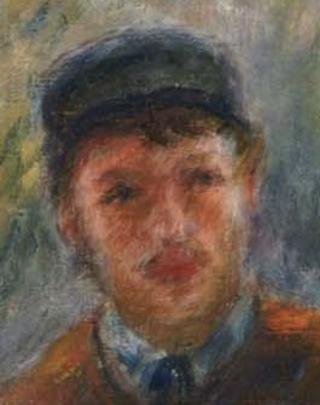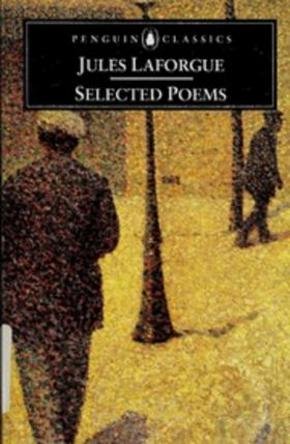ADSactly Literature: Jules Laforgue - The Irruption of Irony in Modern Poetry (Part I)

In the review of the main milestones of poetic modernity, a task that began in this blog last year, we have tackled a group of French writers, some identified with Symbolism, progenitors of modern poetry in the 19th century, among whom Charles Baudelaire, Paul Verlaine, Arthur Rimbaud and Stéphane Mallarmé stand out (there are posts on this blog about each of them written by me).
Related to these, although not expressly, I cannot leave out two more, one of them not so widespread, Jules Laforgue, and another better known, the so-called "Count of Lautréamont", Isidore Ducasse. This post (and its continuation) is dedicated to the first of them, and soon one to the second one.
===============
Jules Laforgue is considered to be one of the fathers of modern poetry, whose poetic work exerted great influence, not at the time but years later, on the promoters of twentieth-century poetry, such as Guillaume Apollinaire, Ezra Pound and T. Eliot, due to three capital aspects present in his poetic production: the use of free verse, the daring use of irony and his colloquial language.
But let's see before following some of his biography. He was born in 1860 in Montevideo (Uruguay), as is also the case of Lautréamont. His parents were originally from France, which is why they returned to that country, first to the city of Tarbes and later to Paris. At the age of 19, he published his first poems in French literary magazines. He devoted himself to the world of arts in studies, and frequented the spaces (museums like the Louvre) and artistic circles in Paris, as well as libraries. Thanks to his friend, the writer Paul Boguet, he was appointed in 1881 reader in French of the German Empress Augusta, wife of William I, whom he accompanied around Germany. There he met Leah Lee, whom he married in 1886. He died in Paris at a very young age, at 27, in 1887, as a result of apparently hereditary tuberculosis.
Laforgue published two books of poems during his lifetime: Lamentations (Les Complaintes) in 1885, and The Imitation of Our Lady the Moon (L'Imitation de Notre-Dame de la Lune) in 1886, and the dramatic poem The Foetic Council (Le Concile féerique). In 1886 he wrote the poems of Flowers of Good Will, which were published posthumously, in 1890. He wrote six philosophical prose stories, gathered in Legendary Moralities (1887), and critical essays on Baudelaire and Corbière. Also after his death, his Last Verses were published in 1890 and in 1901 The Sobbing of the Earth.

Considerations about his vision and work
From the point of view of his attitude and vision of life, he is considered an emblematic "decadent". He was influenced by the philosophical pessimism of Arthur Schopenhauer and Edouard von Hartmann. Balakian describes him as a nihilist and points out that Laforgue, along with others, fostered "the new metaphysics, which consisted of a deep awareness of the emptiness in which man navigates blindly, without knowing where he comes from or where he is going". Hence his identification with Baudelairian tedium ("spleen"), which, as we indicated in his opportunity, is more than mere boredom, a kind of existential nonsense. But we will also find his obsession with the fleeting nature of human existence and a constant reference to the unconscious of the poetic "I", as critics declare.
Initially he identified with the French symbolist current and sympathized with the work of Charles Baudelaire, but from a critical attitude. It is maintained that "he practiced a symbolism of great originality". In reaction to the "exaggerated melodiousness of the Symbolists", as Balakian points out, Laforgue produced a stylistic peculiarity that is expressed in several essential features.
He distances himself from metric regularity; although he uses the sonnet, he violates its frames with freedom through a daring vocabulary, an altered and discontinuous syntactic order.
As noted in the previous post, Rimbaud had made use of free verse; however, it is Laforgue who introduces it with all his strength and simplicity. It was not by chance that he was the first translator of Walt Whitman's poetry into French, from whom he surely derived his inclination towards free verse.
Stripping the verse of excessive ornamentation, he uses an ordinary and colloquial verbal construction, even going so far as to babble, and resorting to pauses and interjections that give the poem a choppy rhythm.

In that colloquial inclination, irony is mixed (or vice versa), which reaches radical levels in his final poems. It is a sceptical, irreverent, sometimes exaggerated irony that can be disturbing. It even manages to have a self-parodic character, little practiced in his time, but which would be very much appreciated later on.
The scholar Andrés Echevarría recognizes the value of Laforgue's contribution in this forceful phrase: "he knew how to expose the beauty of the profane with the aesthetics of simplicity".
As we have indicated, it will be in the poetry of the 20th century (especially the Anglo-Saxon and French ones) where his influence will become effective, both for his way of exercising irony and colloquialism, and for his illogical games, for which the surrealists also valued him very much.
(He will continue with examples and comments on the poems)
Bibliographical references
Balakian, Anna (1969. The symbolist movement. Spain: Edit. Guadarrama.
Todó, Lluís (1987). Symbolism. Spain: Edit. Montesinos.
https://en.wikipedia.org/wiki/Jules_Laforgue
http://www.mcnbiografias.com/app-bio/do/show?key=laforgue-jules
Written by @josemalavem
Click the coin below to join our Discord Server
)
Thanks for sharing
Posted using Partiko Android
Thank you, @shinersfamily.
I was not familiar with Laforge's work. Thanks for bringing it up to our attention. A european poet, influenced by Whitman and who would eventually influence the likes of Eliot or Pound is worth studying.
Laforgue's work is unfortunately little known, despite its relevance to modern poetry, even in Spanish-American literature, as in the poets Leopoldo Lugones and Julio Herrera and Reissig. Scholars note his major influence on Eliot, and highlight his poem, "The Love Song of J. Alfred Prufrock," for example. Pound came to have expressions about Laforgue such as: "He is an incomparable artist". Thank you for your reading, @hlezama.
Hi, @adsactly!
You just got a 0.27% upvote from SteemPlus!
To get higher upvotes, earn more SteemPlus Points (SPP). On your Steemit wallet, check your SPP balance and click on "How to earn SPP?" to find out all the ways to earn.
If you're not using SteemPlus yet, please check our last posts in here to see the many ways in which SteemPlus can improve your Steem experience on Steemit and Busy.
Jules Laforgue is one of mine! The fact that although he uses the sonnet but breaks with metrics and uses resources such as irony and free verse, makes him interesting in his time, especially because he breaks with some schemes. In spite of his short life, his work has been very significant and has influenced other poets. In the staff, I have only read poems from The Lamentations. I will wait for the next part, to know more about his work. Thank you and greetings, @josemalavem.
Grateful for your reading and commentary, @nancybriti Certainly, Laforgue is a poet who escapes from the moulds, a "rare", Rubén Darío would say. I will try to illustrate his features in the poems I will quote in the next post. Greetings.